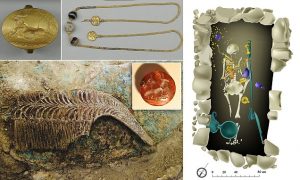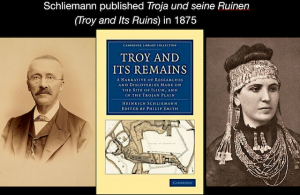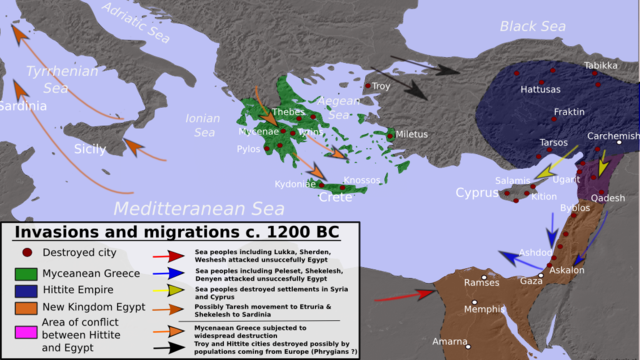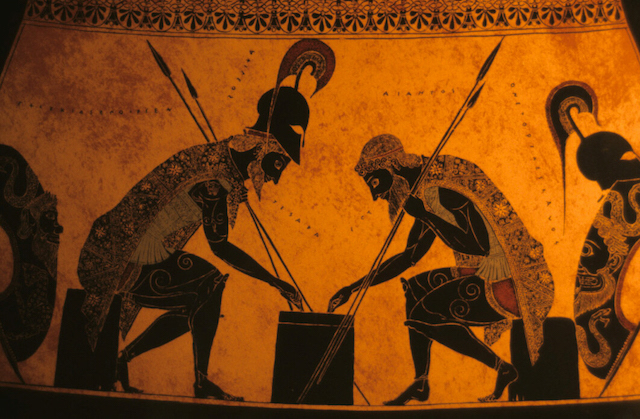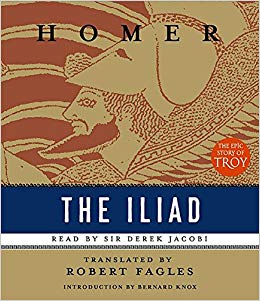Week 1
Week 1: Monday, October 4, 2021
What's So Great About the Greeks
Week 1
What's so great about the Greeks?
Why are we studying them?
Our course of study will propose that the Greeks invented something totally new in civilization and that what they invented is still at the core of our Western Tradition.
Let me share with you a list of ten characteristics of the Ancient Greeks that Edith Hall has explained in her wonderful book, Introducing the Ancient Greeks.
As Hall has explained: "Between 800 and 300 BC, people who spoke Greek made a rapid series of intellectual discoveries that propelled the Mediterranean world to a new level of civilization."
Ten characteristics that distinguish Ancient Greece:
1. seagoing ("like frogs around the pond") swimmers and divers
2. suspicious of authority, reject tyrants (creation of democracy)
3. individualistic (freedom)
4. enquiring minds (science)
5. openness to other cultures (travel, Israel, Phoenicia)
6. articulate (special nature of Greek language) language
The Greeks themselves believed that they were incomparable at talking. They often said that it was this that made them superior to all “barbarians,” a word that originally meant “people who don’t speak Greek but speak unintelligibly.”
Odysseus the best talker of them all rhetoic & poetry
7. sense of humor/wit
8. competitive, passion for excellence (Olympics)
9. the value of beauty Adonis Venus...best athlete should also be the most beautiful
10. pursuit of pleasure, joy, fun
These ten qualities are at the core of the Greek Miracle.
And the Greek Miracle is still at the core of Western Civilization.
REQUIRED READING
RECOMMENDED READING

Edith Hall,
Introducing the Ancient Greeks: From Bronze Age Seafarers to Navigators of the Western Mind,
W. W. Norton & Company; 1 edition (June 16, 2014),
ISBN 0393239985
This is the best one-volume introduction to the Ancient Greeks that I have ever read. And it is almost brand new for us and our class.
Reviews
“Penetrating…Ms. Hall is an engaging writer and an acute scholar.”
- James Romm, Wall Street Journal
“[Hall’s] book is a hearty, delightful voyage through 2,000 years of Greek history, written with wit and verve and deep insight.”
- Mark Gamin, Cleveland Plain Dealer
“In Edith Hall’s new and groundbreaking study of ancient Greek culture, society, and mentality over a millennium and more, from Agamemnon to Constantine, she acutely identifies and brilliantly explains why we simply cannot do without the ancient Greeks.”
- Paul Cartledge, A. G. Leventis Professor of Greek Culture, University of Cambridge, and the author of The Greeks: A Portrait of Self and Others
“Edith Hall’s characteristically original approach to the world of classical antiquity is on full display in this introductory survey of the ancient Greeks and their enduring accomplishments.”
- Froma Zeitlin, Ewing Professor of Greek Language and Literature, emerita, Princeton University
“In this vivacious and learned book, Edith Hall distills the essence of Hellenic culture to discover the secrets of its success and stamina. Filled with striking anecdotes and little-known facts, this book will delight any student of the ancient Greek world.”
- Adrienne Mayor, Stanford University, and author of The Poison King
“Introducing the Ancient Greeks is informative and inspiring. With deep expertise and unabashed enthusiasm, Edith Hall surveys the whole history of the ancient Greeks and pinpoints the shared traits that explain their enduring achievements.”
- Sheila Murnaghan, professor of classics studies and Alfred Reginald Allen Memorial Professor of Greek, University of Pennsylvania
About the Author
Edith Hall is one of Britain’s foremost classicists, having held posts at the universities of Cambridge, Durham, Reading, and Oxford. She is the author and editor of more than a dozen works and now teaches at King’s College London.
2
Week 2: Monday, October 11, 2021
The Bronze Age Charioteers
Week 2
2000 BC
Bronze Age Charioteer Invasions
Bronze metallurgy, the wheel, the chariot, and language.
How the Bronze Age Charioteers changed history.

REQUIRED READING
RECOMMENDED READING

Edith Hall,
Introducing the Ancient Greeks: From Bronze Age Seafarers to Navigators of the Western Mind,
W. W. Norton & Company; 1 edition (June 16, 2014),
ISBN 0393239985
3
Week 3: Monday, October 18, 2021
Minos, Mycenae and Nestor
Week 3
Somewhere in the early years of the second millenium BC (1500-2000 BC), a whole new civilization was born in various cities of mainland Greece. The one we know best is Mycenae, the city of Agamemnon and his family. Agamemnon was the son of King Atreus and Queen Aerope of Mycenae, the brother of Menelaus, the husband of Clytemnestra and the father of Iphigenia, Orestes and Chrysothemis. When Helen, the wife of Menelaus, was taken to Troy by Paris, Agamemnon commanded the united Greek armed forces in the ensuing Trojan War. All around Mycenae and the Ancient Greek heroes another culture on the island of Crete flourished that was older than Mycenae. Tonight we want to visit that culture, the world of King Minos and his daughter Ariadne, and to see how that culture moved onto the mainland and influenced the new world of Agamemnon. Finally we will visit Pylos, the city of Nestor and the recently discovered Griffin Warrior's Tomb (see below).
REQUIRED READING
RECOMMENDED READING

Margalit Fox,
The Riddle of the Labyrinth: The Quest to Crack an Ancient Code,
Ecco; 1st edition (May 14, 2013),
ISBN 0062228838

Edith Hall,
Introducing the Ancient Greeks: From Bronze Age Seafarers to Navigators of the Western Mind,
W. W. Norton & Company; 1 edition (June 16, 2014),
ISBN 0393239985
4
Week 4: Monday, October 25, 2021
Troy and Heinrich Schliemann
Week 4
DISCOVERING TROY
THE ARCHAEOLOGISTS
HEINRICH SCHLIEMANN (1822-1890)
REQUIRED READING
RECOMMENDED READING

Edith Hall,
Introducing the Ancient Greeks: From Bronze Age Seafarers to Navigators of the Western Mind,
W. W. Norton & Company; 1 edition (June 16, 2014),
ISBN 0393239985
5
Week 5: Monday, November 1, 2021
The Bronze Age Collapse
Week 5
The Bronze Age collapse involved a dark-age transition period in the Near East, Asia Minor, Aegean region, North Africa, Caucasus, Balkans and the Eastern Mediterranean from the Late Bronze Age to the Early Iron Age, a transition which historians believe was violent, sudden, and culturally disruptive. The palace economy of the Aegean region and Anatolia that characterised the Late Bronze Age disintegrated, transforming into the small isolated village cultures of the Greek Dark Ages. The half-century between c. 1200 and 1150 BC saw the cultural collapse of the Mycenaean kingdoms, of the Kassite dynasty of Babylonia, of the Hittite Empire in Anatolia and the Levant, and of the Egyptian Empire; and a period of chaos in Ancient Israel. The deterioration of these governments interrupted trade routes and severely reduced literacy in much of the known world. In the first phase of this period, almost every city between Pylos and Gaza was violently destroyed, and many abandoned, including Hattusa, Mycenae, and Ugarit. According to Robert Drews: "Within a period of forty to fifty years at the end of the thirteenth and the beginning of the twelfth century almost every significant city in the eastern Mediterranean world was destroyed, many of them never to be occupied again." This was the period of the Trojan War and Moses leading his people out of Egypt. This may also be the time the Etruscans left Anatolia and migrated to Italy (Herodotus). (Wikipedia)
REQUIRED READING
RECOMMENDED READING

Edith Hall,
Introducing the Ancient Greeks: From Bronze Age Seafarers to Navigators of the Western Mind,
W. W. Norton & Company; 1 edition (June 16, 2014),
ISBN 0393239985

Robert Drews,
The End of the Bronze Age,
Princeton University Press; 6th Print edition (December 22, 1995),
ISBN 0691025916

Eric H. Cline,
1177 B.C.: The Year Civilization Collapsed,
Princeton University Press; Revised edition (September 22, 2015),
ISBN 0691168385
6
Week 6: Monday, November 8, 2021
Rebirth After Collapse: Homer in Smyrna
Week 6
Who was Homer?
Where did he live?
When did he live? (c. 780-700 BC?)
Was he a real person?
Was the author Homer really a committee?
Several authors combined?
Did he write both the Iliad and the Odyssey?
Here below is part of the article on Homer in the Wikipedia:
Homer is the legendary author of the Iliad and the Odyssey, two epic poems that are the central works of ancient Greek literature. The Iliad is set during the Trojan War, the ten-year siege of the city of Troy by a coalition of Greek kingdoms. It focuses on a quarrel between King Agamemnon and the warrior Achilles lasting a few weeks during the last year of the war. The Odyssey focuses on the journey home of Odysseus, king of Ithaca, after the fall of Troy. Many accounts of Homer's life circulated in classical antiquity, the most widespread being that he was a from Ionia, a region of central coastal Anatolia in present-day Turkey. The Homeric Question—concerning by whom, when, where and under what circumstances the Iliad and Odyssey were composed—continues to be debated. Broadly speaking, modern scholarly opinion falls into two groups. One holds that most of the Iliad and (according to some) the Odyssey are the works of a single poet of genius. The other considers the Homeric poems to be the result of a process of working and re-working by many contributors, and that "Homer" is best seen as a label for an entire tradition. It is generally accepted that the poems were composed at some point around 800 BC-750 BC. The poems are in Homeric Greek, also known as Epic Greek, a literary language which shows a mixture of features of the Ionic and Aeolic dialects. Most researchers believe that the poems were originally transmitted orally. From antiquity until the present day, the influence of the Homeric epics on Western civilization has been great, inspiring many of its most famous works of literature, music, art and film.
REQUIRED READING
RECOMMENDED READING

Edith Hall,
Introducing the Ancient Greeks: From Bronze Age Seafarers to Navigators of the Western Mind,
W. W. Norton & Company; 1 edition (June 16, 2014),
ISBN 0393239985
7
Week 7: Monday, November 15, 2021
The Iliad
Week 7
READ:
BOOK I (Rage of Achilles),
BOOK VI (Hector's Book),
Book IX (Embassy to Achilles).
REQUIRED READING
RECOMMENDED READING

Edith Hall,
Introducing the Ancient Greeks: From Bronze Age Seafarers to Navigators of the Western Mind,
W. W. Norton & Company; 1 edition (June 16, 2014),
ISBN 0393239985
Principal Characters in The Iliad
Greeks (Achaeans, Argives, Danaans).
Agamemnon: commander of the Greek forces, king of Mycenae, son of Atreus [Atreides].
Menelaus: king of Lacedaemon (Sparta), brother of Agamemnon, husband of Helen.
Helen: wife of Menelaus, daughter of Zeus and Leda, sister of Clytemnestra.
Clytemnestra: wife of Agamemnon.
Achilles: leader of the Myrmidons, king of Phthia (in Thessaly), son of Peleus and Thetis.
Patroclus: son of Menoetius, Achilles' companion.
Nestor: elderly king of Pylos.
Odysseus: king of Ithaca.
Ajax: son of Telamon, from Salamis.
Diomedes: king of Argos, son of Tydeus.
Calchas: chief seer of the Greeks.
Gods Allied with the Greeks
Hera: sister and consort of Zeus, goddess of marriage, particularly associated with Argos and Mycenae.
Athena: daughter of Zeus; goddess of wisdom, culture, craftsmanship (especially domestic crafts); a martial goddess as well [Pallas Athena].
Poseidon: brother of Zeus; god of sea, horsemanship, earthquakes.
The Trojans
Priam: elderly king of Troy.
Hecuba: wife of Priam.
Hector: leader of the Trojan forces, favorite son of Priam and Hecuba.
Paris (Alexander): brother of Hector, abductor of Helen.
Sarpedon: king of Lycia, son of Zeus and Laodameia.
Aeneas: son of Anchises and Aphrodite.
Gods Allied with the Trojans
Aphrodite: daughter of Zeus and Dione, goddess of sexual desire, protectress of Helen [Cyprian].
Apollo: son of Zeus and Leto; brother of Artemis; god of culture, poetry, music, healing, archery.
Ares: son of Zeus and Hera, god of war and violence.
Other Gods
Zeus: ruler of the gods; god of sky, weather, the thunderbolt.
Hades: ruler of the nether world, brother of Zeus [Hades is used to signify the god's realm (i.e. hell) as well as the god himself].
Hephaestus: son of Hera, lame god of blacksmiths.
Iris: messenger of the gods, goddess of the rainbow.
Hermes: another messenger-god; patron of travelers, thieves, and charlatans; conductor of dead souls on journey to Hades.
NEXT WEEK: Thanksgiving Week, November 22-26
Classes will not be held the week of November 22-26, Thanksgiving vacation.
Students have stated they prefer having the week off; many are traveling for the holidays.
8
Week 8: Monday, November 29, 2021
The Iliad, week 2
Week 8
REQUIRED READING
RECOMMENDED READING

Edith Hall,
Introducing the Ancient Greeks: From Bronze Age Seafarers to Navigators of the Western Mind,
W. W. Norton & Company; 1 edition (June 16, 2014),
ISBN 0393239985
9
Week 9: Monday, December 6, 2021
The Odyssey
Week 9
Did Homer write both The Iliad and The Odyssey?
Why are they different?
Why do they cover different things and different stories?
Was it written later, maybe late in the 8th Century BC.?
REQUIRED READING
RECOMMENDED READING

Edith Hall,
Introducing the Ancient Greeks: From Bronze Age Seafarers to Navigators of the Western Mind,
W. W. Norton & Company; 1 edition (June 16, 2014),
ISBN 0393239985
10
Week 10: Monday, December 13, 2021
Odysseus: Quintessential Greek Hero
Week 10
ODYSSEUS
- seagoing (like frogs around the pond) swimmers and divers
- suspicious of authority (creation of democracy)
- individualistic (freedom)
- enquiring minds (science)
- openness to other culture (travel)
- articulate language (special nature of Greek): The Greeks themselves believed that they were incomparable at talking. They often said that it was this that made them superior to all “barbarians,” a word that originally meant “people who don’t speak Greek but speak unintelligibly.” Odysseus was the best talker of them all.
- sense of humor/wit
- competitive, passion for excellence (Olympics)
- the value of beauty: Adonis Venus best athlete should also be the most beautiful.
- pursuit of pleasure, joy, fun
- Odysseus embodies all of these essential characteristics of the ancient Greeks.
REQUIRED READING
RECOMMENDED READING

Edith Hall,
Introducing the Ancient Greeks: From Bronze Age Seafarers to Navigators of the Western Mind,
W. W. Norton & Company; 1 edition (June 16, 2014),
ISBN 0393239985
All
Week 1: Mon., Oct. 4, 2021
What's So Great About the Greeks
Week 1
What's so great about the Greeks?
Why are we studying them?
Our course of study will propose that the Greeks invented something totally new in civilization and that what they invented is still at the core of our Western Tradition.
Let me share with you a list of ten characteristics of the Ancient Greeks that Edith Hall has explained in her wonderful book, Introducing the Ancient Greeks.
As Hall has explained: "Between 800 and 300 BC, people who spoke Greek made a rapid series of intellectual discoveries that propelled the Mediterranean world to a new level of civilization."
Ten characteristics that distinguish Ancient Greece:
1. seagoing ("like frogs around the pond") swimmers and divers
2. suspicious of authority, reject tyrants (creation of democracy)
3. individualistic (freedom)
4. enquiring minds (science)
5. openness to other cultures (travel, Israel, Phoenicia)
6. articulate (special nature of Greek language) language
The Greeks themselves believed that they were incomparable at talking. They often said that it was this that made them superior to all “barbarians,” a word that originally meant “people who don’t speak Greek but speak unintelligibly.”
Odysseus the best talker of them all rhetoic & poetry
7. sense of humor/wit
8. competitive, passion for excellence (Olympics)
9. the value of beauty Adonis Venus...best athlete should also be the most beautiful
10. pursuit of pleasure, joy, fun
These ten qualities are at the core of the Greek Miracle.
And the Greek Miracle is still at the core of Western Civilization.
REQUIRED READING
RECOMMENDED READING

Edith Hall,
Introducing the Ancient Greeks: From Bronze Age Seafarers to Navigators of the Western Mind,
W. W. Norton & Company; 1 edition (June 16, 2014),
ISBN 0393239985
This is the best one-volume introduction to the Ancient Greeks that I have ever read. And it is almost brand new for us and our class.
Reviews
“Penetrating…Ms. Hall is an engaging writer and an acute scholar.”
- James Romm, Wall Street Journal
“[Hall’s] book is a hearty, delightful voyage through 2,000 years of Greek history, written with wit and verve and deep insight.”
- Mark Gamin, Cleveland Plain Dealer
“In Edith Hall’s new and groundbreaking study of ancient Greek culture, society, and mentality over a millennium and more, from Agamemnon to Constantine, she acutely identifies and brilliantly explains why we simply cannot do without the ancient Greeks.”
- Paul Cartledge, A. G. Leventis Professor of Greek Culture, University of Cambridge, and the author of The Greeks: A Portrait of Self and Others
“Edith Hall’s characteristically original approach to the world of classical antiquity is on full display in this introductory survey of the ancient Greeks and their enduring accomplishments.”
- Froma Zeitlin, Ewing Professor of Greek Language and Literature, emerita, Princeton University
“In this vivacious and learned book, Edith Hall distills the essence of Hellenic culture to discover the secrets of its success and stamina. Filled with striking anecdotes and little-known facts, this book will delight any student of the ancient Greek world.”
- Adrienne Mayor, Stanford University, and author of The Poison King
“Introducing the Ancient Greeks is informative and inspiring. With deep expertise and unabashed enthusiasm, Edith Hall surveys the whole history of the ancient Greeks and pinpoints the shared traits that explain their enduring achievements.”
- Sheila Murnaghan, professor of classics studies and Alfred Reginald Allen Memorial Professor of Greek, University of Pennsylvania
About the Author
Edith Hall is one of Britain’s foremost classicists, having held posts at the universities of Cambridge, Durham, Reading, and Oxford. She is the author and editor of more than a dozen works and now teaches at King’s College London.
Week 2: Mon., Oct. 11, 2021
The Bronze Age Charioteers
Week 2
2000 BC
Bronze Age Charioteer Invasions
Bronze metallurgy, the wheel, the chariot, and language.
How the Bronze Age Charioteers changed history.

REQUIRED READING
RECOMMENDED READING

Edith Hall,
Introducing the Ancient Greeks: From Bronze Age Seafarers to Navigators of the Western Mind,
W. W. Norton & Company; 1 edition (June 16, 2014),
ISBN 0393239985
Week 3: Mon., Oct. 18, 2021
Minos, Mycenae and Nestor
Week 3
Somewhere in the early years of the second millenium BC (1500-2000 BC), a whole new civilization was born in various cities of mainland Greece. The one we know best is Mycenae, the city of Agamemnon and his family. Agamemnon was the son of King Atreus and Queen Aerope of Mycenae, the brother of Menelaus, the husband of Clytemnestra and the father of Iphigenia, Orestes and Chrysothemis. When Helen, the wife of Menelaus, was taken to Troy by Paris, Agamemnon commanded the united Greek armed forces in the ensuing Trojan War. All around Mycenae and the Ancient Greek heroes another culture on the island of Crete flourished that was older than Mycenae. Tonight we want to visit that culture, the world of King Minos and his daughter Ariadne, and to see how that culture moved onto the mainland and influenced the new world of Agamemnon. Finally we will visit Pylos, the city of Nestor and the recently discovered Griffin Warrior's Tomb (see below).
REQUIRED READING
RECOMMENDED READING

Margalit Fox,
The Riddle of the Labyrinth: The Quest to Crack an Ancient Code,
Ecco; 1st edition (May 14, 2013),
ISBN 0062228838

Edith Hall,
Introducing the Ancient Greeks: From Bronze Age Seafarers to Navigators of the Western Mind,
W. W. Norton & Company; 1 edition (June 16, 2014),
ISBN 0393239985
Week 4: Mon., Oct. 25, 2021
Troy and Heinrich Schliemann
Week 4
DISCOVERING TROY
THE ARCHAEOLOGISTS
HEINRICH SCHLIEMANN (1822-1890)
REQUIRED READING
RECOMMENDED READING

Edith Hall,
Introducing the Ancient Greeks: From Bronze Age Seafarers to Navigators of the Western Mind,
W. W. Norton & Company; 1 edition (June 16, 2014),
ISBN 0393239985
Week 5: Mon., Nov. 1, 2021
The Bronze Age Collapse
Week 5
The Bronze Age collapse involved a dark-age transition period in the Near East, Asia Minor, Aegean region, North Africa, Caucasus, Balkans and the Eastern Mediterranean from the Late Bronze Age to the Early Iron Age, a transition which historians believe was violent, sudden, and culturally disruptive. The palace economy of the Aegean region and Anatolia that characterised the Late Bronze Age disintegrated, transforming into the small isolated village cultures of the Greek Dark Ages. The half-century between c. 1200 and 1150 BC saw the cultural collapse of the Mycenaean kingdoms, of the Kassite dynasty of Babylonia, of the Hittite Empire in Anatolia and the Levant, and of the Egyptian Empire; and a period of chaos in Ancient Israel. The deterioration of these governments interrupted trade routes and severely reduced literacy in much of the known world. In the first phase of this period, almost every city between Pylos and Gaza was violently destroyed, and many abandoned, including Hattusa, Mycenae, and Ugarit. According to Robert Drews: "Within a period of forty to fifty years at the end of the thirteenth and the beginning of the twelfth century almost every significant city in the eastern Mediterranean world was destroyed, many of them never to be occupied again." This was the period of the Trojan War and Moses leading his people out of Egypt. This may also be the time the Etruscans left Anatolia and migrated to Italy (Herodotus). (Wikipedia)
REQUIRED READING
RECOMMENDED READING

Edith Hall,
Introducing the Ancient Greeks: From Bronze Age Seafarers to Navigators of the Western Mind,
W. W. Norton & Company; 1 edition (June 16, 2014),
ISBN 0393239985

Robert Drews,
The End of the Bronze Age,
Princeton University Press; 6th Print edition (December 22, 1995),
ISBN 0691025916

Eric H. Cline,
1177 B.C.: The Year Civilization Collapsed,
Princeton University Press; Revised edition (September 22, 2015),
ISBN 0691168385
Week 6: Mon., Nov. 8, 2021
Rebirth After Collapse: Homer in Smyrna
Week 6
Who was Homer?
Where did he live?
When did he live? (c. 780-700 BC?)
Was he a real person?
Was the author Homer really a committee?
Several authors combined?
Did he write both the Iliad and the Odyssey?
Here below is part of the article on Homer in the Wikipedia:
Homer is the legendary author of the Iliad and the Odyssey, two epic poems that are the central works of ancient Greek literature. The Iliad is set during the Trojan War, the ten-year siege of the city of Troy by a coalition of Greek kingdoms. It focuses on a quarrel between King Agamemnon and the warrior Achilles lasting a few weeks during the last year of the war. The Odyssey focuses on the journey home of Odysseus, king of Ithaca, after the fall of Troy. Many accounts of Homer's life circulated in classical antiquity, the most widespread being that he was a from Ionia, a region of central coastal Anatolia in present-day Turkey. The Homeric Question—concerning by whom, when, where and under what circumstances the Iliad and Odyssey were composed—continues to be debated. Broadly speaking, modern scholarly opinion falls into two groups. One holds that most of the Iliad and (according to some) the Odyssey are the works of a single poet of genius. The other considers the Homeric poems to be the result of a process of working and re-working by many contributors, and that "Homer" is best seen as a label for an entire tradition. It is generally accepted that the poems were composed at some point around 800 BC-750 BC. The poems are in Homeric Greek, also known as Epic Greek, a literary language which shows a mixture of features of the Ionic and Aeolic dialects. Most researchers believe that the poems were originally transmitted orally. From antiquity until the present day, the influence of the Homeric epics on Western civilization has been great, inspiring many of its most famous works of literature, music, art and film.
REQUIRED READING
RECOMMENDED READING

Edith Hall,
Introducing the Ancient Greeks: From Bronze Age Seafarers to Navigators of the Western Mind,
W. W. Norton & Company; 1 edition (June 16, 2014),
ISBN 0393239985
Week 7: Mon., Nov. 15, 2021
The Iliad
Week 7
READ:
BOOK I (Rage of Achilles),
BOOK VI (Hector's Book),
Book IX (Embassy to Achilles).
REQUIRED READING
RECOMMENDED READING

Edith Hall,
Introducing the Ancient Greeks: From Bronze Age Seafarers to Navigators of the Western Mind,
W. W. Norton & Company; 1 edition (June 16, 2014),
ISBN 0393239985
Principal Characters in The Iliad
Greeks (Achaeans, Argives, Danaans).
Agamemnon: commander of the Greek forces, king of Mycenae, son of Atreus [Atreides].
Menelaus: king of Lacedaemon (Sparta), brother of Agamemnon, husband of Helen.
Helen: wife of Menelaus, daughter of Zeus and Leda, sister of Clytemnestra.
Clytemnestra: wife of Agamemnon.
Achilles: leader of the Myrmidons, king of Phthia (in Thessaly), son of Peleus and Thetis.
Patroclus: son of Menoetius, Achilles' companion.
Nestor: elderly king of Pylos.
Odysseus: king of Ithaca.
Ajax: son of Telamon, from Salamis.
Diomedes: king of Argos, son of Tydeus.
Calchas: chief seer of the Greeks.
Gods Allied with the Greeks
Hera: sister and consort of Zeus, goddess of marriage, particularly associated with Argos and Mycenae.
Athena: daughter of Zeus; goddess of wisdom, culture, craftsmanship (especially domestic crafts); a martial goddess as well [Pallas Athena].
Poseidon: brother of Zeus; god of sea, horsemanship, earthquakes.
The Trojans
Priam: elderly king of Troy.
Hecuba: wife of Priam.
Hector: leader of the Trojan forces, favorite son of Priam and Hecuba.
Paris (Alexander): brother of Hector, abductor of Helen.
Sarpedon: king of Lycia, son of Zeus and Laodameia.
Aeneas: son of Anchises and Aphrodite.
Gods Allied with the Trojans
Aphrodite: daughter of Zeus and Dione, goddess of sexual desire, protectress of Helen [Cyprian].
Apollo: son of Zeus and Leto; brother of Artemis; god of culture, poetry, music, healing, archery.
Ares: son of Zeus and Hera, god of war and violence.
Other Gods
Zeus: ruler of the gods; god of sky, weather, the thunderbolt.
Hades: ruler of the nether world, brother of Zeus [Hades is used to signify the god's realm (i.e. hell) as well as the god himself].
Hephaestus: son of Hera, lame god of blacksmiths.
Iris: messenger of the gods, goddess of the rainbow.
Hermes: another messenger-god; patron of travelers, thieves, and charlatans; conductor of dead souls on journey to Hades.
NEXT WEEK: Thanksgiving Week, November 22-26
Classes will not be held the week of November 22-26, Thanksgiving vacation.
Students have stated they prefer having the week off; many are traveling for the holidays.
Week 8: Mon., Nov. 29, 2021
The Iliad, week 2
Week 8
REQUIRED READING
RECOMMENDED READING

Edith Hall,
Introducing the Ancient Greeks: From Bronze Age Seafarers to Navigators of the Western Mind,
W. W. Norton & Company; 1 edition (June 16, 2014),
ISBN 0393239985
Week 9: Mon., Dec. 6, 2021
The Odyssey
Week 9
Did Homer write both The Iliad and The Odyssey?
Why are they different?
Why do they cover different things and different stories?
Was it written later, maybe late in the 8th Century BC.?
REQUIRED READING
RECOMMENDED READING

Edith Hall,
Introducing the Ancient Greeks: From Bronze Age Seafarers to Navigators of the Western Mind,
W. W. Norton & Company; 1 edition (June 16, 2014),
ISBN 0393239985
Week 10: Mon., Dec. 13, 2021
Odysseus: Quintessential Greek Hero
Week 10
ODYSSEUS
- seagoing (like frogs around the pond) swimmers and divers
- suspicious of authority (creation of democracy)
- individualistic (freedom)
- enquiring minds (science)
- openness to other culture (travel)
- articulate language (special nature of Greek): The Greeks themselves believed that they were incomparable at talking. They often said that it was this that made them superior to all “barbarians,” a word that originally meant “people who don’t speak Greek but speak unintelligibly.” Odysseus was the best talker of them all.
- sense of humor/wit
- competitive, passion for excellence (Olympics)
- the value of beauty: Adonis Venus best athlete should also be the most beautiful.
- pursuit of pleasure, joy, fun
- Odysseus embodies all of these essential characteristics of the ancient Greeks.
REQUIRED READING
RECOMMENDED READING

Edith Hall,
Introducing the Ancient Greeks: From Bronze Age Seafarers to Navigators of the Western Mind,
W. W. Norton & Company; 1 edition (June 16, 2014),
ISBN 0393239985


